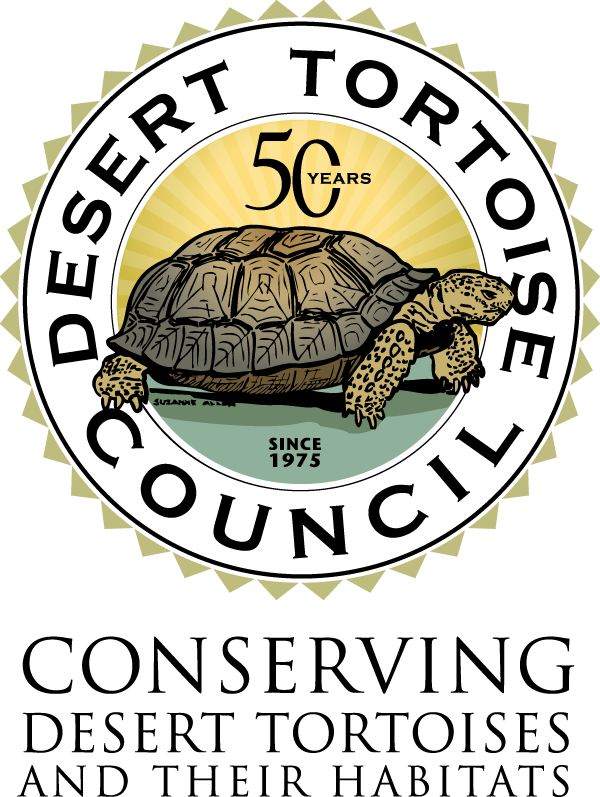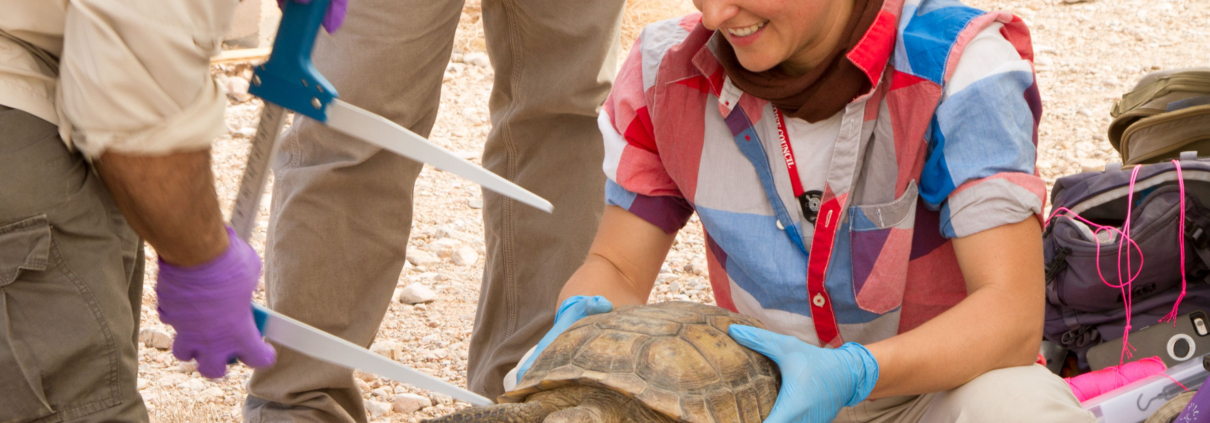Course Details
Health Assessment Procedures for Translocations of the Mojave Desert Tortoise is a four-day advanced course only open to those with extensive tortoise handling experience. Assessing health and collecting biological samples are the most sophisticated activities routinely permitted by the U.S. Fish and Wildlife Service for desert tortoises and are not appropriate tasks for novice individuals. In order to maximize the educational benefit for students and use class time as effectively as possible, prospective students should be familiar with basic tortoise biology, behavior, and natural history and have experience in basic skills such as identifying sex and weighing and measuring tortoises.
It is highly recommended that you register for this class only if you will have the immediate opportunity to conduct health assessments and collect samples following successful course completion and permitting. Many students can expect to need additional supervised practice of some skills following the course. Additionally, implementation of required recertification in the future can be expected.
In order to secure a spot on the roster, you will need to confirm that you have experience in category #1 (Tortoise Handling Experience) and either category #2 (Desert Experience) or #3 (Education and Research). Please review the requirements below and be prepared to document your experience in detail.
1. Tortoise Handling Experience
A. Handled, weighed, and measured wild tortoises or other turtles (any species) on 20 occasions.
AND
B. Handled, weighed, and measured tortoises or other turtles (any species) on 100 occasions (inclusive of A).
OR
C. Attached and removed transmitters to tortoises or other turtles (any species) on 20 occasions (separate from A).
OR
D. Assisted (handling/holding) with health assessments of tortoises or other turtles (any species) on 20 occasions under direct supervision of permitted personnel (separate from A).
OR
E. Observed desert tortoises in the wild on 100 occasions AND handled, weighed, and measured tortoises or other turtles (any species) on 40 occasions (inclusive of A).
2. Desert Experience
Three years of desert field experience.
3. Education or Research
A. Advanced degree in medicine, veterinary medicine, herpetology, wildlife biology, or closely related field.
OR
B. Training and experience with biological sample collection, including blood on other chelonians or wildlife species.
Cost: $2000
Content of Course
This course is an advanced training module for desert tortoise field workers and researchers designed and organized by a highly experienced cooperative group of federal, state, county, and independent biologists and wildlife veterinarians. The course prepares students to conduct the standardized health assessments that are required by the U.S. Fish and Wildlife Service prior to and following the translocation of desert tortoises from project sites. Information is presented through lectures and specialized hands-on training using live desert tortoises. Students’ understanding of the concepts taught in the course and ability to conduct health assessments and collect biological samples will be evaluated by course instructors. Evaluation will include a written exam and practical exam. During the practical exam students will be evaluated on the following seven skills: Handling, Biosecurity, Physical Exam/Body Condition Scoring, Oral Swab, Subcarapacial Venipuncture, Epicoelomic Fluid Administration, and Sample Processing.
Authorization Facts
Following course completion, documentation of participation in the course will be provided and recommendations will be made as to whether you have sufficient understanding of the course material and are capable of conducting health assessments and collecting biological samples independently, under supervision, or not at all. This documentation does not authorize you to conduct any of the activities, rather a copy of the documentation should be submitted with any permit application or authorized individual request (existing permits).
Participation in the course does not guarantee that you will be permitted by U.S. Fish and Wildlife Service to conduct the activities for which you receive training. Demonstration of your continued proficiency with the protocols and/or continuing education may be required at a later date to remain qualified to request authorization via a federal permit.
Course Quick Links
Our email for this course is: email hidden; JavaScript is required.
What to Bring and Wear to the Course
Please bring your clean personal tortoise processing field gear. This should include a scale (and string or tape, if spring scale), calipers, clipboard, GPS, thermometer pens/pencils, a fine point Sharpie, pliers or multi-tool, small portable cooler, and camera. Gloves, health sampling supplies, and disinfectant will be provided.
Dress such that you are comfortable in both a classroom and field setting. Many tortoise handling sessions (including testing) will be outdoors in a field-like setting (hat and water bottle recommended). Videographers may be present, and we ask that clothing provide sufficient coverage during activities that will involve bending, squatting, and sitting in various positions (e.g., long tops or a shirt wrapped around the waist may be helpful).
Lodging Options
TBA for upcoming course.

